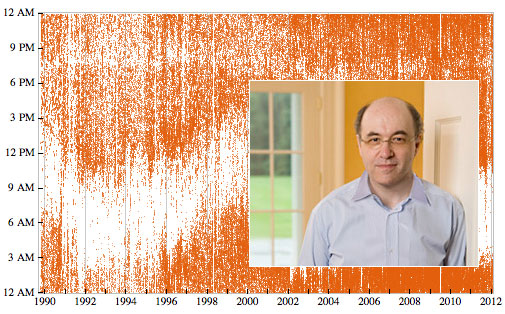Stephen Wolfram has analyzed his life

The developer of the software package Mathematica and the scientific search engine Wolfram Alpha Stephen Wolfram laid out the results of the analysis of digital data that had accumulated over the years. Among other things - the visualization of 300 thousand sent e-mails since 1989, 100 million keystrokes since 2002, phone calls, meetings, editing time for files of various types since 1980, etc. As a result, there were some interesting correlations between various aspects of life, as well as structural changes that have occurred over the decades.
Such a personal analysis can be done by everyone using the new search engine Wolfram Alpha Pro.
Stephen Wolfram expresses confidence that sooner or later each person will begin to collect and sort data about himself, keeping this archive for later analysis. “But since I became interested in data analysis a long time ago, I started doing this many years ago. I thought that so many do, but it turned out not. So now I have probably the largest archive of personal data in the world, ”the scientist writes.
')

A map of the letters sent since 1989 shows how irregular the mode of work was for a scientist until 2002, until he finally finished work on the book “A New Kind of Science”. It is evident that he often woke up at night to send a letter.

The longest Stephen Wolfram has been keeping statistics on file editing time: more than 30 years. The blue dots on the map correspond to text files, the green ones to program code C, the red dots are Mathematica code, the orange ones are html, php, and other markup files (in 2002 Stephen finished the book)
“What is the future of personal analytics? It opens up a whole range of new features Some of them are based on the analysis of large-scale trends, others on the identification of specific events or anomalies, and some on the extraction of “stories” from personal data. Over time, I hope I can ask Wolfram Alpha questions about all aspects of my life over any period of time - and receive instant reports in return. It not only can work as a supplement to my own memory, but also perform automatic computational analysis — explain how and why certain events happened — and then make planning and forecasting for the future. With the development of personal analytics, we can get a completely new dimension of life experience, ” writes Stephen Wolfram.
Source: https://habr.com/ru/post/139693/
All Articles